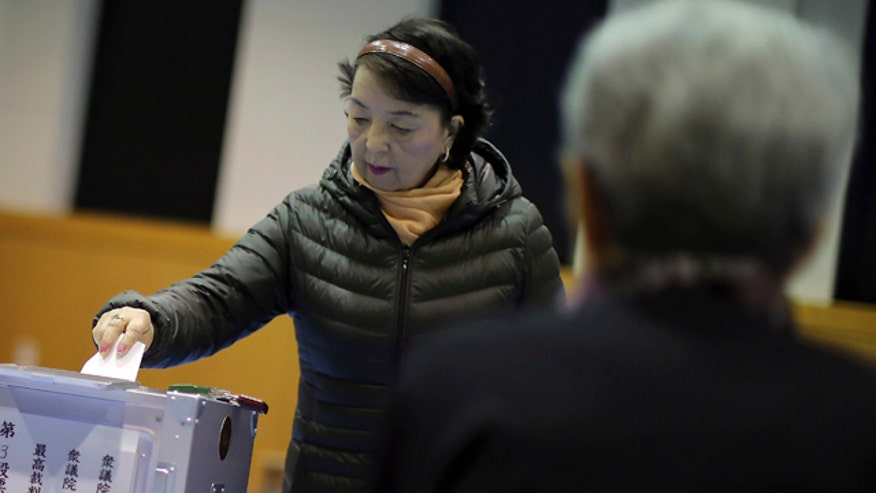Japan voters expected to return Abe to power in snap election
 |
| December 14, 2014: A woman casts her vote for parliament's lower house election as a representative, right, of a local election administration commission observes at a polling station in Tokyo. (AP Photo/Eugene Hoshiko) |
From remote islands to high mountains where polling stations stood ready with firecrackers to scare away bears, voters were choosing among 1,191 candidates for the 475-seat lower house.
"I think Mr. Abe is the only choice we have considering from what I heard and saw in the reports," retiree Hiroshi Yamada said as he came out of a downtown Tokyo polling station.
He was echoing sentiments shared by many Japanese. Despite weakening popularity ratings, a recession and messy campaign finance scandals, Abe's Liberal Democratic Party is virtually certain to triumph thanks to Japan's tendency toward a one-party political system, voter apathy and a lack of viable alternatives.
A landslide victory could improve Abe's chances of pushing ahead with ambitious political and economic reforms -- including revising Japan's pacifist constitution -- with or without the support of the Liberal Democrats' coalition partner, the Buddhist-backed Komei Party.
Abe called Sunday's snap election for the lower house, saying that he wanted a fresh mandate for his economic program and that he would step down if the Liberal Democrats lose their majority.
But weakness among opposition parties makes that unlikely: The Liberal Democrats were fielding 352 candidates versus 198 for the leading opposition Democratic Party of Japan. The second-largest number of candidates was running with the Japan Communist Party, which holds only a handful of seats in parliament but is a popular choice as a protest vote.
The Democratic Party held power from 2009 to 2012, but its popularity plunged after it failed to deliver on campaign pledges and struggled in the aftermath of the 2011 earthquake, tsunami and nuclear disasters.
Abe took office two years ago promising to revive the stagnant economy and restore Japan's fading stature. Since then, share prices have risen and many companies have reported record profits as the Japanese yen has weakened in value, thanks to aggressive monetary easing.
But the economic recovery that began before Abe took office has faltered in recent months, with the country returning to recession after a sales tax hike chilled demand among consumers and businesses.
Many voters were perplexed over the decision to call an election.
"I think two years (since Abe became prime minister) is too soon to decide whether his policy failed or not," said Yoshiko Takahashi, a Tokyo businesswoman.
Surveys ahead of the election showed many voters planning to stay away, and heavy snow in northern Japan -- the top news Sunday morning -- could also adversely affect turnout. But the government reported a 10 percent increase in absentee ballots over the previous election, in 2012, which drew a record-low turnout of 59.3 million.
A landslide victory would facilitate Abe's efforts to revise the constitution and pursue other nationalist policies. His longstanding efforts toward those goals, which include the successful passage of a state secrets act and efforts to expand the scope of Japan's military activities, have already roiled relations with China.

No comments:
Post a Comment